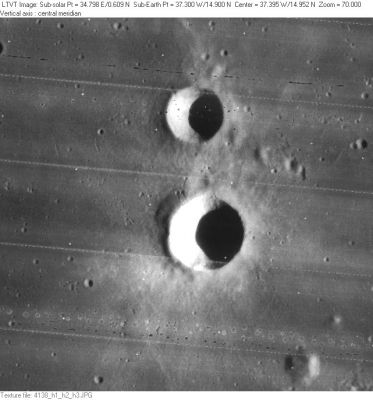Bessarion
Contents
Bessarion - and Virgil (Bessarion E) immediately north of it
|
Lat: 14.9°N, Long: 37.3°W, Diam: 10 km, Depth: 2 km, Rükl: 19 |
LO-IV-138H Bessarion is the larger of the two craters with 8-km diameter Bessarion E (H.P.Wilkins's Virgil) to its north. Note the hillock Bessarion Eta near the frame's lower right corner.
Images
LPOD Photo Gallery Lunar Orbiter Images Apollo Images
- The distinct pair Bessarion and Bessarion E was also photographed by Apollo 15's oblique southward looking Fairchild camera. Frame AS15-M-2601 shows the pair near the central part of the curved horizon.
- Research: Danny Caes
Maps
(LAC zone 57B1) LAC map Geologic map
Description
Description: Elger
(IAU Directions) BESSARION.--A bright little ring-plain, about 6 miles in diameter, in the Oceanus Procellarum N. of Kepler. There is a smaller and still brighter companion on the N. (Bessarion E), standing on a light area. Bessarion has a minute central hill, difficult to detect.
Description: Wikipedia
Additional Information
- Depth data from Kurt Fisher database
Arthur, 1974: 2 km
Westfall, 2000: 2 km
Viscardy, 1985: 2 km
Cherrington, 1969: 0.91 km - Included in ALPO list of bright ray craters
- The rare bottle-shaped crater Bessarion B is an interesting target for telescopic observers of the Bessarion region.
The (east of) Bessarion V region of Irregular Mare Patches (IMPs)
- East of Bessarion V is the location of several fields of small Irregular Mare Patches (IMPs):
- LAT 14.4598 / LON -33.7315
- LAT 14.9174 / LON -33.7000
Nomenclature
- Basilius Bessarion (January 2, 1403 – November 18, 1472), a Roman Catholic Cardinal Bishop and the titular Latin Patriarch of Constantinople, was one of the illustrious Greek scholars who contributed to the great revival of letters in the 15th century.
- Bessarion E (the bowl-shaped crater just north of Bessarion itself) was called Virgil ("a great Roman poet (70-19 B.C.)") by Wilkins and Moore, but the IAU did not accept that name.
- Greek lettered hills and hillocks in the neighborhood of Bessarion: the most nearby one is Bessarion Eta south-southeast of Bessarion. Between Bessarion and Bessarion G (west of Bessarion) are two hillocks once known as Bessarion Zeta and Bessarion Theta. East-southeast of Bessarion are two hills once known as Bessarion Xi and Bessarion Lambda. See also chart SLC E4 (System of Lunar Craters, 1966).
- Not mentioned in the SLC E3 and SLC F3 charts is the hillock east of Bessarion D, which is nicknamed Bessarion D hillock by D.Caes. See: http://bit.ly/2uLU44U (also captured on Chart 21 - page 55, in the 21st Century Atlas of the Moon, C.A.Wood, M.J.S.Collins).
LPOD Articles
Overwhelmed by Goodies (lower photograph shows the rare bottle-shaped crater Bessarion B as seen by the Lunar Reconnaissance Orbiter)
Bibliography
